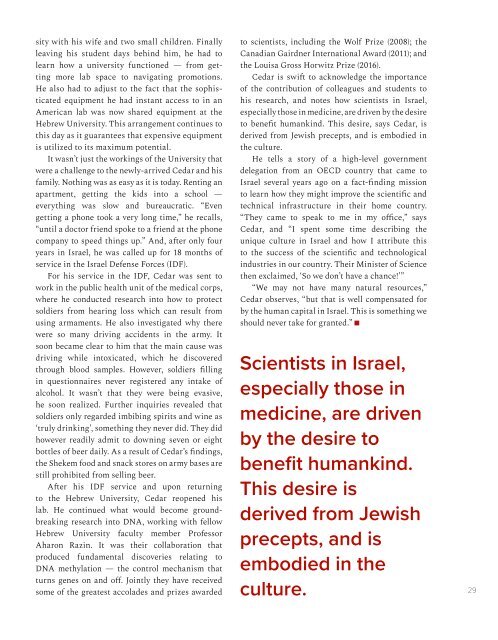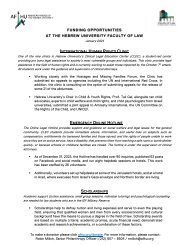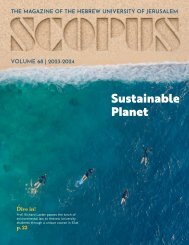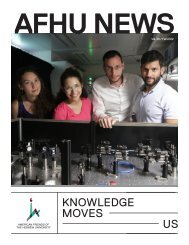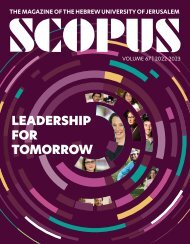Scopus 2018
Create successful ePaper yourself
Turn your PDF publications into a flip-book with our unique Google optimized e-Paper software.
The Future of the Israeli<br />
Innovative Economy<br />
by Eugene Kandel<br />
succeed, their productivity level rises. They are very<br />
supportive of each other, while at the same time<br />
highly competitive. They do not expect favors from<br />
the government.<br />
The most important feature of the Innovative<br />
Economy is that we fiercely compete for these<br />
companies and people with the rest of the world.<br />
Many foreign firms and governments are willing<br />
and ready to pay significant amounts to attract<br />
them. Even without this inducement, many Israeli<br />
firms and their investors choose to move operations<br />
overseas, so as to be closer to their key markets and<br />
sources of financing. There is some understanding<br />
of this in the government, so the Innovative<br />
Economy is less regulated and less taxed, but even<br />
this understanding is starting to lose its consensus<br />
in politics. This economy used to grow very rapidly,<br />
yet in the last couple of years — while financing is<br />
still growing — its share of employment has started<br />
to shrink.<br />
The Main Economy (basically, everyone else) is<br />
much more local, much less productive, and much<br />
more risk averse. In many respects this economy<br />
depends on the government to support it or bail<br />
it out. Perhaps as a result it is excessively regulated,<br />
unionized, and more heavily taxed. The feeling is that<br />
The Innovative Sector is an engine that pulls<br />
all the other cars in the economy. We, at the<br />
National Economic Council, used this metaphor<br />
to convince the Israeli government to adopt an<br />
economic and social strategy, and established<br />
dedicated processes and institutions to support<br />
it, which we developed with several partners.<br />
If I had to use the train metaphor today, I would<br />
draw a picture of two separate trains, on separate<br />
tracks, one much further ahead and moving much<br />
faster than the other. They would symbolize two<br />
different economies: the Innovative Economy and,<br />
for the lack of a better term, the Main Economy.<br />
Many years of studying and helping shape the<br />
Israeli economy in various capacities has taught me<br />
that it was a mistake to look at the Israeli economy<br />
as a single unit. I believe that Israel, unlike other<br />
countries, or perhaps somewhat ahead of them,<br />
has become partitioned into two very different<br />
economies that are practically disconnected from<br />
each other.<br />
Eugene Kandel is the Emil Speyer Professor of<br />
The Innovative Economy employs almost nine<br />
Economics and Finance at the Hebrew University. At percent of the workforce and produces close to 15<br />
the University, he founded the Center for Financial percent of its GDP (both are much higher than in<br />
Markets and Institutions and the MA program in Finance<br />
any other country), while pushing the frontiers of<br />
and Financial Economics. He is the CEO of Start-Up<br />
technology worldwide. People running innovative<br />
Nation Central and previously served as the Head of the<br />
National Economic Council (NEC) and as the Economic companies and working in them think and operate<br />
Advisor to the Prime Minister of Israel.<br />
differently from the rest, and their firms are run,<br />
structured, and financed very differently than<br />
most firms in the Main Economy. They feel at<br />
home anywhere in the world. They are happy to<br />
take chances and welcome challenges. If they fail,<br />
“If I had to use the train metaphor today, I would draw a picture of two separate trains, on separate tracks; one<br />
38 they get up and start something new, and if they<br />
much further ahead and moving much faster than the other.”<br />
39


